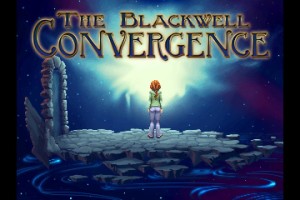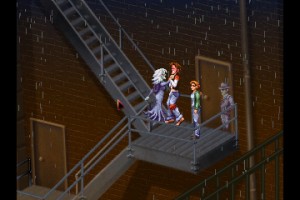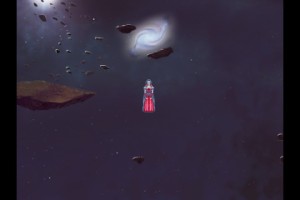Taking place several decades after [Blackwell Unbound] and a mere six months after [The Blackwell Legacy], [The Blackwell Convergence] is the third game in the Blackwell pentalogy produced by [Wadjet Eye Games] and [Dave Gilbert]. Once again, Rosangela Blackwell (in all of her awkward glory) is our female protagonist, well-acclimated to life as a spirit medium after working alongside series darling Joey Mallone for half a year. In our latest story, Rosangela finds herself having to find a balance between masquerading as a normal human being (which was difficult enough before Joey entered her life) and being a living magnet for the supernatural and supernaturally odd. This game marks the return of the “switch character” mechanic, as well as Joseph Mitchell (the minor character the series is desperately trying to convince you is actually important) and a mentally unwell rag mop (the series antagonist known as “The Countess”).

This entry also signals the return of my interest in this series. As I mentioned in my earlier review of [Blackwell Unbound], I found it difficult to enjoy Unbound as a stand-alone game. As a supplementary work for the overall plot, it was short, poorly written, and altogether unnecessary. Convergence feels very much like the true continuation of the story, and my enjoyment of the third Blackwell game has the unfortunate side effect of hammering home how meaningless the second game was. Only one of the characters present in Convergence that was introduced in Unbound had any real meaning, any real purpose to their existence in the overarching plot. Once the second, useless character exited the scene, you’re left wondering if there wasn’t a better way for Dave Gilbert to convey the largely boring information dump the character offered in some other way.

That leads to another issue Convergence has that it seems to have inherited from Unbound: the nasty habit of introducing a character just for the purpose of eliciting a response from the game’s protagonist before they’re unceremoniously the victim of assassination (either of their character or literally). This unpleasant ritual of using a side character’s suffering as a plot device or a driving factor of the hero’s growth (Women in Refrigerators comes to mind) is a piss-poor substitute for actual writing. In Unbound, it was The Countess, and in Convergence, it’s the alcoholic, cynical street artist Claude. Teased as someone Rosa could open herself up to (besides Nishanthi) and gleefully hinted as a potential love interest (by Nishanthi; I admit: I love her), not even 10 seconds pass between you deciding to open yourself up to him and him being murdered by the living (or not) plot device of the previous game. As someone who thoroughly enjoys the series and wholeheartedly wants Rosa to come out on top when it comes to the interpersonal relationships she was sorely in need of when she was introduced, the treatment of her character during her attempts to reach out to others is starting to get on my nerves. It’s understandable considering her line of work that her behavior on occasion may turn off certain individuals, and it’s entirely believable that the issues she has with forming lasting relationships is the result, direct cause and compounding factor of her eternal awkwardness (I will admit that much). But of all her interactions throughout the series thus far, only three individuals haven’t threatened her with legal action (and the third person seems to just want money from her). Truthfully, it feels like Dave Gilbert had the idea of making Rosa as painfully awkward as possible, realized that her level of awkwardness would make it near impossible for her to have friends or make a life for herself, and just decided to go ahead with it anyways. I know that, as a work of fiction, suspension of belief is necessary, but Rosa’s characterization is too far-fetched to be believable, even taking her life circumstances into consideration (breaking into abandoned buildings, loitering in the apartment buildings of dead people, and being a yard away from a person’s mysterious death should at least get her brought in for questioning, but NO, it’s NEW YORK; weird people acting suspiciously is totally normal, right?).

Now onto more pleasant subjects: Joey’s vastly more useful now than in the previous games. While his actions in Unbound were limited to “float and snark”, Convergence finds Joey with more control of the environment. The introduction of the “blowing” mechanic and the player’s control over the use of Joey’s tie means that Joey is more than your personal spy: he can distract cats, move extremely light objects across smooth surfaces… yeah, that’s about it. But, it’s still more than when the “switch character” mechanic was first introduced, so it’s a step in the right direction. His relationship with his partner has changed, although it’s hard to say if this is good or bad; while he was slightly more forgiving of Rosa’s gawkiness at the end of Legacy, his shortness with her during her amateur moments in Convergence can be interpreted as him either disliking her or expecting a level of self-assuredness and poise Lauren seemed to have naturally. Both he and Rosa, without a doubt, get along better than he and Lauren did, at least, as evidenced by Rosa’s continual attempts to tell dorky jokes, even when Joey urges her to stop. They have a pleasant camaraderie going, a stark contrast to the bitter ball-and-chain team dynamic of the leads in Unbound, and it’s this promise of a lifelong friendship for Rosa that makes the relationship even better.

As with Unbound, the audio and visual quality has vastly improved from the previous entries in the series (but at this point, it’s to be expected). The character colors and portraits are noticeably cleaner and less unnatural looking (although Joey looks off), and the characters move more smoothly than before. The ambient noises and jazz-inspired soundtrack were a treat to listen to (I especially enjoy Rosa’s theme, which plays in her apartment), but I question some song choices (such as whatever the heck that theme was that played during the initial start-up of the game). The end theme (“I Can See Into Forever” by Thomas Regin) was excellent (I might actually download it), but it also reminded me of a supernatural day-time drama about a woman who could see ghosts and spent her days sending them off: “Ghost Whisperer” starring Jennifer Love Hewitt (totally a coincidence, I’m sure); the song had a really “90’s” feel to it (which it should, since that’s around the time the game takes place). Taking into account the quality of content and the length of the game (about as long as Unbound and Legacy, combined), The Blackwell Convergence is an excellent addition to the Blackwell series, and is thus far my favorite; it does a lot to draw the player even deeper into the story and flesh out the protagonists, while finally putting to rest meaningless characters. There’s room for improvement, but Blackwell is getting there, slowly but surely.
Pros:
- The blossoming friendship between a dork and her ghost
- Nishanthi is still a ray of sunshine
- Ding Dong! The Witch is Dead
- The only Joseph who matters still exists in the end
- Okay, but seriously, the sound and artwork are getting better
- The “switch character” mechanic is utilized well
Cons:
- Characters meant to pay homage to real world figures are meaningless to the plot, forgettable and just plain odd
- Joey’s portrait looks weird (I can’t let that go; I’m not even sorry)
- Characters are still being created and destroyed all willy-nilly for no other purpose than to fill space and provide unneeded and unnecessary exposition
- No Moti 😦
- The number of characters voiced by Dave Gilbert is steadily increasing…